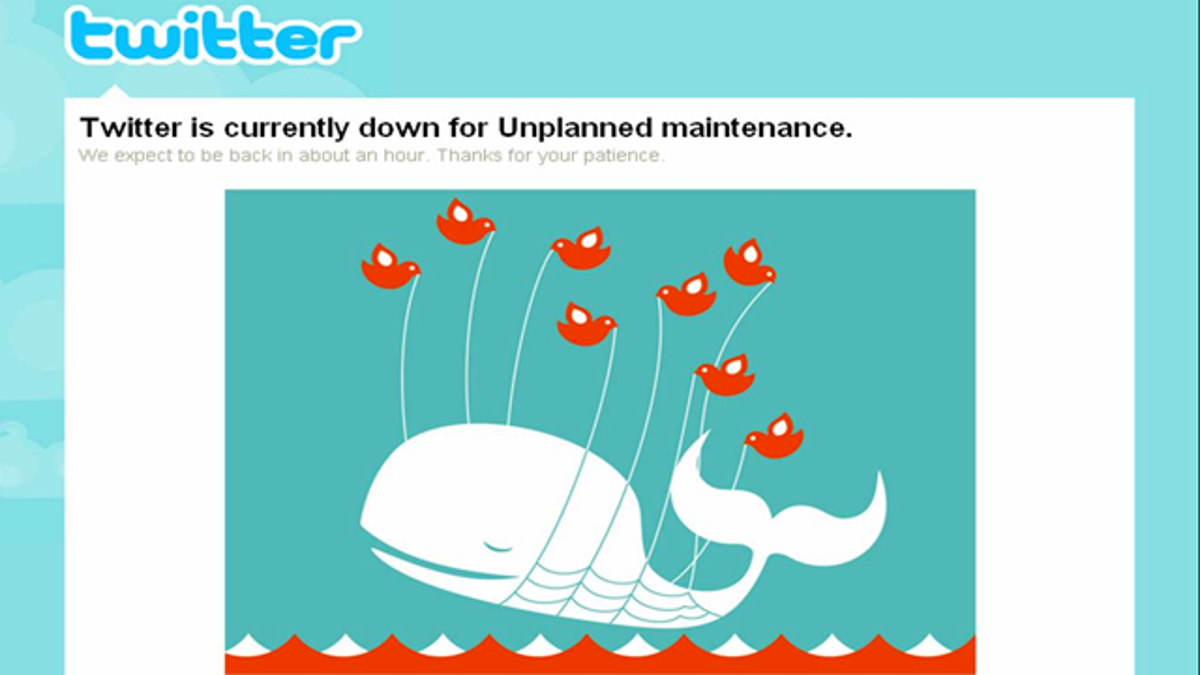
A familiar site for many Twitter users: the site's so called "Fail Whale," posted when there is a service disruption or the site is over capacity. (Twitter)
Can censorship ever be a good thing? Twitter wants you to think so, but the company appears to have stepped on a slippery slope coated in lard.
Twitter recently announced a new feature by which it could and would block certain Tweets and accounts in selective parts of the world when the message or the user ran afoul of local laws. Previously, if the company had to block a Tweet, it had to do so globally.
Twitter is pitching this as a good thing. A message may be banned in Bangalore, but remain visible in Bangor.
The truth, however, is that it's about making money -- forget about social networking revolutionizing communications or the democratizing effect of the Internet. Forget about all that idealistic Arab Spring Tweeting. It's time to get down to business and expand into new markets, no matter what the politics are.
Unfortunately, this new supposedly forward-looking censorship Twitter feature is actually extremely myopic. It forces the company to become global digital police force, making decisions about religious views, culture, morality, and politics. Will the company now, for example, block messages in a country like Syria at the request of a repressive government? Will it keep information about studying and education from female Twitter users in countries that ban such education? Will it ban some critical messages about Scientology in one country, and conversely ban positive messages about Scientology in other countries?
So why would a service that has functioned extremely well until now, suddenly change its whole business model and devote countless resources to creating and then enforcing such censorship on a location-by-location basis? Answer: Money.
In the first place, Twitter has already run afoul of government laws and not necessarily in places you'd expect. In the U.K., for example, there's a law that protects the very wealthy from blackmail. Dubbed the super-injunction, it essentially allows a celebrity or wealthy individual to ask a court to ban the publication of any information in a case regarding a personal scandal. It does not matter that the story is true, under a super injunction not only is the media stopped from publishing stories, it's even illegal to reveal the existence of the injunction.
A case last spring involving an affair by married footballer Ryan Giggs was alluded to in the British press (who still won't name him) but any details about it were banned by a super-injunction. This essentially became null and void when a Twitter user posted the soccer star's name for the whole world to see.
Giggs' representatives then filed a lawsuit demanding the identity of the Twitter user. By providing the new selective blocking feature, Twitter can avoid such legal entanglements in the future. (Note to scandal prone British celebs: You may now proceed as usual.) Incidentally, the woman involved in the affair with Giggs now has over 270,000 Twitter followers herself. I couldn't locate an official Giggs Twitter account.
The even bigger economic issue for Twitter is China. At the moment, Twitter is banned by the government there. But China represents possibly the biggest future market for tech companies. The new blocking feature could enable Twitter to appease Chinese censors (much as other tech companies have changed their technology to suit the Chinese authorities).
The real problem will come for Twitter in determining where it draws the line about censoring messages and accounts.
If a local law in a Midwest U.S. state bans certain kinds of family planning or abortion information from being disseminated to teenage women, would Twitter then censor any information to people logging on in that state? If Canadian authorities complain that coverage of a gruesome murder trial in Toronto by U.S. journalists violates Canadian laws, will Twitter censor those journalists' accounts in Canada? What about diverging religious views in certain countries? And what about calls for civil disobedience in foreign countries that outlaw protests? (Note: Prince Alwaleed bin Talal of Saudia Arabia recently invested $300 million dollars in Twitter, which raised questions among many bloggers about possible political motives given how Twitter was used in various revolutions in countries adjacent to Saudi Arabia.)
Other companies like Google have gone back and forth, fighting with and then working with authorities such as the Chinese government. But I don't think Twitter is going to be able to endure such fence-sitting. The main reason is that Twitter is all about messaging, and if you kill the messenger, you kill the service.
As it stands now, Twitter is essentially offering authorities a free, customized censorship service. And that's not very social at all.
Follow John R. Quain on Twitter @jqontech or find more tech coverage at J-Q.com.








































